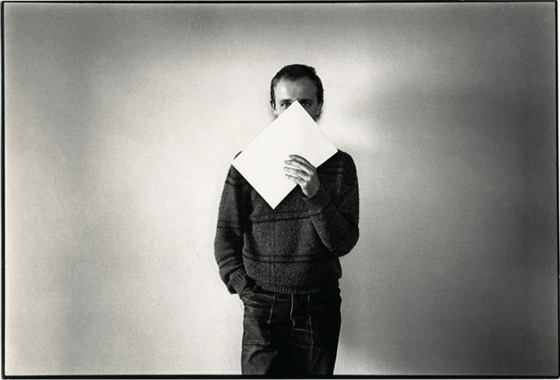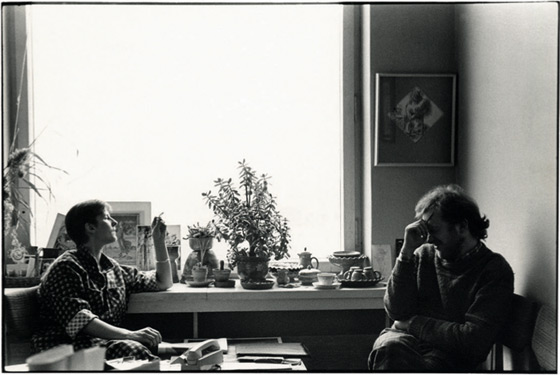|
|
| In Memoriam Normunds Naumanis 12.01.1962.–12.09.2014. | |
 Andrejs Grants. Normunds from the series Colleagues, friends, acquaintances. 1987 Courtesy of andrejs Grants | |
| “Riga is so small that there is a chronic shortage of people – at least for me – with whom i can talk in my language and at my level. at times it gets me down so much that i have to scream,” wrote normunds naumanis in a private letter, eleven years ago. however, he continued as he’d started, conversing through his texts with every person at his level in latvia. using the aristocratic precept for the spirit, coined by theatre and cinema critic Valentīna freimane, whose student he’d been as well: share what you have been given, your vision, no matter what is happening around you, no matter what the times are like. Freimane’s lecture theatres drew whole generations of actors and directors away from ignorance and provincialism during the soviet years, opening up the spiritual world of humanity within them in its entire spectrum and scope, not allowing them to become plebeian, to become narrow-minded. Naumanis, too, continued to develop this spiritual moral obligation on the latvian scene through his texts, in a different era and in more modern language, bringing into being krišjānis Valdemārs’ imperative about latvia as a society of intelligent people. not only during the 1980s, the so-called “rebuilding years”, when he was a maximalist twenty-year-old, having just completed his studies at the institute of theatre arts in the multi-million metropolis of moscow with its world-class lecturers. charged up with world-class vision and knowledge, he returned to latvia, where he began to make revisions within the field of culture. that is, within life. because to naumanis culture was never just a garnish to life; culture was its foundation and a network of spiritual energy completely intertwined with life. the baroque magnificence and contextual swing he imparted to the latvian language, right from the very start, signalled that everyone would be addressed at a world-class level. and never at a trifling or lower level. His texts never lost their density of content or passion in their ideas, even in the later years when consumerism and commercialism began to take over the common space in a massive way, as soviet ideology had also done in its time. Naumanis the employee opposed this process in a lesser way and could quite comfortably mix rumours, yellow-press-type material and art processes together in his articles, writing popcorn statements, convincing himself and others that it couldn’t be done any other way. naumanis’ talent stood up more against the “new barbarism” with his unusual ability to reveal and distinguish art, knowing how to open it up for others. his artistic essence. because naumanis was an artist himself, too – an artist of commentary. his comments were often more multi-layered, more vital, more stimulatory of thought, more powerful in scale than the phenomena to be observed, the essence of which he could enter into as few could. “i was there, i know” – naumanis loved to quote poets when he came outside, and he thereby allowed everyone else to also feel what’s happening there, inside art. The sensitivity of naumanis’ texts and the energy of his words had a hypnotic power, even making people who were not really interested in what he was writing about – the theatre, visual art and literature – read his articles. naumanis’ texts attracted people powerfully to phenomena in art and culture and then released them with an already altered internal world. naumanis had a rare feature in these times – concern. he plunged into life and art. and what he had to say was always electrifying and full of energy. and it had the law of imperishability. Margarita Zieda | |
 Andrejs Grants. Literatūra un Māksla editorial office. Laima Slava and Normuds Naumanis in the Art and Architecture department. 1987 Courtesy of andrejs Grants | |
| “Each has their own naumanis” is a phrase i can’t get out of my head. now, in his canonised image, normunds naumanis continues to work in our field of culture, one could say already at the behest of the seeker: we’ll quote him, maybe even ask ourselves “what would naumanis say about that?”, or we’ll look for support in the body of criteria that will crystallise under the name of normunds naumanis, theatre and cinema critic. but maybe we’ll just remember what a dear and sincere lad he was at the times when he wasn’t insufferable, namely, when he wasn’t late in submitting a text. to each his own.... When naumanis appeared on the riga scene, at the Literatūra un māksla (literature and art) editorial office in the mid 1980s, after his studies in moscow, he charmed everyone not just with the breadth of his vision, his sharp mind and literary gifts but also as the centre around whom everything spinned in an incalculable, nerve-tickling whirlpool while zest for life gained a new dimension. everyone who experienced it will say that this time cannot be imagined without naumanis’ presence. and later, with the renewal of latvian independence, it was specifically naumanis’ ability in his texts to simultaneously open up and unite the world as a living, nascent and inexhaustible cultural phenomenon that was needed by every self-respecting cultural publication, including Studija magazine, which began publishing at the end of 1997. because it was clear that it was purely and simply naumanis alone who could report on current world-class phenomena in an understandable and attractive way, with vim and liveliness. for example, about robert wilson, the “theatre god” of the time, whose amazing performances were simultaneously like sculptural installations, living paintings and architectonic, design-like creations, he wrote in 1998: “that’s the advantage of a classical education: to concede the defeat of the mind under the influence of art,” saluting aristotle. it was precisely this beautiful capitulation, which naumanis knew like no one else how to dress up in words, that made all of his reviews and texts seem alive. he knew how to write and – the main thing – he knew how to think, to create a text that generated an impulse in the mind of the reader, and not only regarding the theatre. For example, about the photographic works of our own multiartist ilmārs blumbergs – a scenographic story of sorts at Venice’s church of san lio about “man as an image” in the context of contemporary mythology, about the most powerful impressions from the 2001 Venice biennale exposition, and so on and so on. but i’d like to cite the introductory paragraph of the text about artist ilya kabakov as being significant: “he wanted to become better – if with this word we want and understand a person’s desire to improve, cultivate and nourish his internal world, his spiritual life, his anima mundi, and, without doubt, to do that and not to murmur in a selfdefeating way the always-useful mea culpa, mea maxima culpa (at times it seems that those people who have a generally developed sense of conscience still excuse themselves rather too often with words of contrition, but in truth... oh, but who really knows what it’s really like within oneself, much less entering someone else’s skin).” To keep or, more accurately, to accept as a condition – as a secret – and at the same time to release an inkling, to give significance to every moment; yes, of course, by manifesting the world of art as an integral feature of life, naumanis was able to do this like nobody else. Perhaps truly, with naumanis’ passing, a complete challengingly romantic and versatile era of critical minds has passed? I believe – i’m even convinced – that naumanis will be read and uncovered anew again and again; he will be quoted and will be mentioned. already during his lifetime there wasn’t enough of him for everyone. now, we’ll have to dig deeper into what seemed to have been allocated to us as matter-of-course, as daily food for thought. but naumanis’ texts were never mundane. Laima Slava | |
| go back | |







